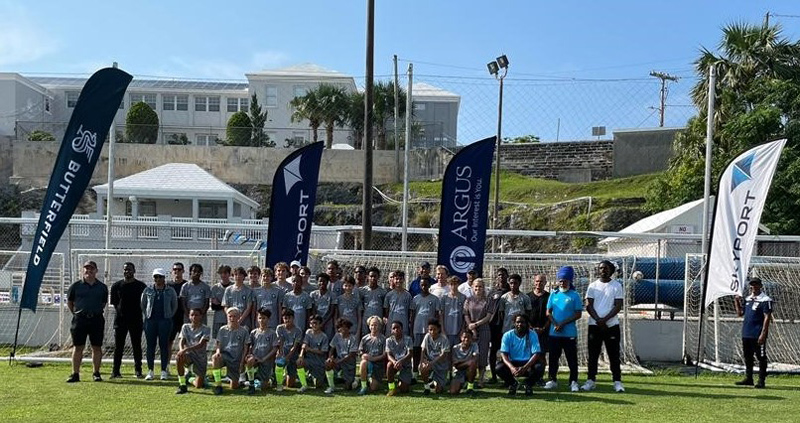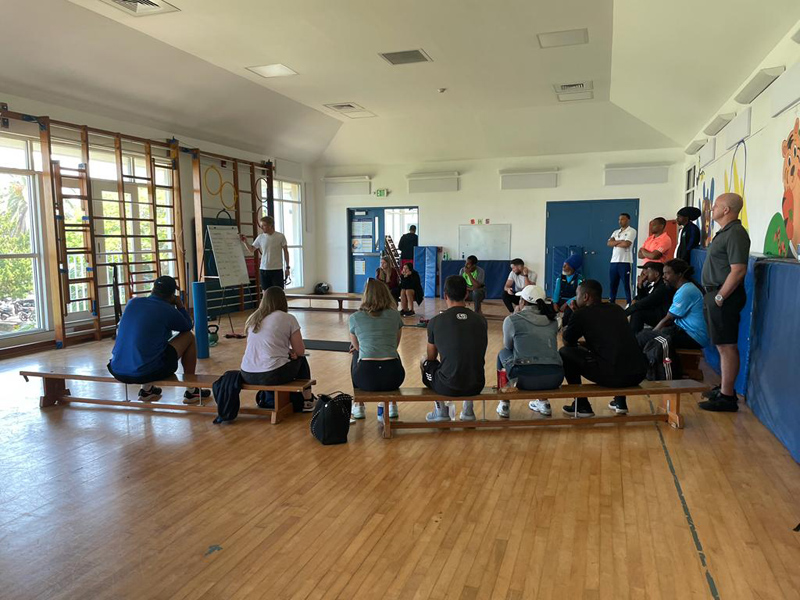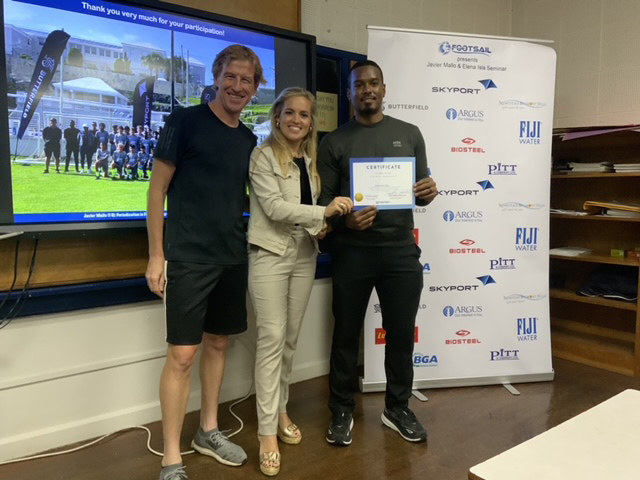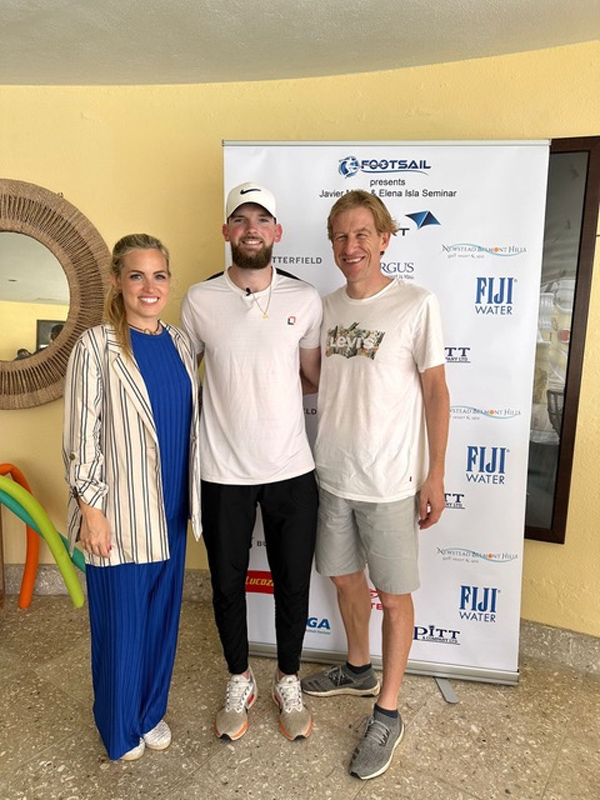Footsail Invites Mallo & Isla Back To Bermuda
Footsail Ltd has invited Javier Mallo and Elena Isla back to Bermuda this year.
A spokesperson said, “Following the highly successful 2022 seminar, Footsail Ltd invited Javier Mallo and Elena Isla back to Bermuda this year.”
Footsail Ltd partner Richard Calderon said, “Staging these events is rarely inexpensive, so we are extremely grateful for the generous and continued support that we have received from our sponsors: Skyport, The Argus Group, The Butterfield Group, Newstead Belmont Hills Golf Resort, BGA & Pitt Co. Without their support, events like these are often cost prohibitive. We are also appreciative of the assistance provided by our host venues BHS and Saltus School.
“Our aim from day one has always been singularly focused: to assist with improving the level of local coaches by providing them with access to cutting edge information, delivered by world class practitioners, without having to leave Bermuda. And by extension, deliver this information to hundreds of footballers/athletes in their schools and in their clubs.
“Having Elena and Javier return to Bermuda to continue their lectures to a cross section of football coaches, physiotherapists, strength and conditioning coaches, physical education teachers, trainers and students has been invaluable. Our aim is to have them back in Bermuda, in 2024.”
The spokesperson said, “The main objective of the 2023 seminar was to provide a novel approach to strength training and injury prevention in football.”
Javier Mallo said, “The contents of the seminar are founded in the demands experienced by the players when playing football. Ensuring the development of movement quality should be our major concern as conditioning coaches and thus, we will structure all our Strength theoretical and practical sessions around this idea, showing how to prepare footballers for training sessions and matches, how to design gym-based strength sessions and how to integrate strength with our physical qualities during the field sessions.
“To complement this, we will also address in depth the occurrence of injuries seen in females and young players in modern football. We will explain how to design and implement injury prevention strategies, from a theoretical and practical point of view. Finally, we will pay attention to how to integrate all the topics covered in the seminar in the long-term development of players.”
The spokesperson said, “In between sessions, Mallo and Isla took time out to talk with local strength and conditioning coach and seminar participant, Liam Evans [owner of Evans Performance Training], for his podcast.”
Mr. Evans said, “What is your background/current role?”
Ms. Isla said, “I continue to work as the team doctor with the U19 team of Real Madrid as well as the Spanish Basketball Federation as the Head of Medical Services.”
Mr. Mallo said, “I studied the sports science in Physical Education, and now with the change of the programs, it’s a sports science degree in the University of Spain. Then I did my PhD in sports science applied to football. Since I was young, I started working in football, mainly as a fitness coach or standard and conditioning coach, and also as an assistant coach.
“I worked with semi-professional and professional teams in Spain for around 10 years. Then I also did a degree in physiotherapy around 2010. I had the chance to move to England to work for Manchester City. I worked two seasons there in England with the Manchester City first team, and then I came back to Spain because I had the chance to work for Real Madrid, where I stayed for nine years.
“I started in the academy as the head of strength and conditioning with the academy and working for the second team. And from 2016 to 2021, I worked for the first team.”
Mr. Evans said, “I know how it is in North America and a few other countries, but in Spain is it a requirement to have a background [degree] in sports science or physiology? Your background is a PhD in Sports Sciences and a Masters in High Performance in Sports. Is that something that people need if they want to go into that role as a strength and conditioning coach?”
Mr. Mallo said, “A hundred percent. Yeah. In order to be qualified as a professional or work in any professional league in Spain you need the degree in sports science.”
Mr. Evans said, “As a young player coming into Madrid’s Academy, are there any assessments you guys are doing or things you’re looking for from the players?”
Mr. Mallo said, “From the fitness point of view there are not so much physical tests to enter the academy but once you are in the most important thing is to assess the movement quality of the players. That’s the thing, I think we’ve changed the mentality in the last 10, 15 years from going to quantity – at the beginning it was more like endurance tests, Cooper tests, etc.
“Now people are going into the quality tests – how do you move, how do you land, change of directions. I think there’s a change of mentality in the way fitness is perceived in football.”
Mr. Evans said, “With sleep and nutrition being so important, is that something that you guys really try to educate the players on?”
Ms. Isla said, “Nutrition, yeah. For example, during the year, we prepare with the nutrition department different types of educational information for the academy. But I think that we have to start working with the base categories with the youngest ones.
“We also keep track of the weight, height, and other anthropometry tests and try to implement a weekly diary. For example, how they eat from Monday to Sunday. We find that a lot of kids go to school without having breakfast.”
Mr. Evans said, “Do you have them fill out any wellness questionnaires?”
Mr. Mallo said, “Yes. There are some questions about sleep quality or fatigue, not so much about the nutrition. I think nutrition is one of the things in the last few years that there are now people in the academy that handle that direction. We have more nutritionists now so they are in charge of that. Sleep comes more in the wellness questionnaire.”
Ms. Isla said, “In my case with the under 19 team, they answer very specific things on the wellness questionnaire. But, you have to be careful because they may not always be truthful or tell you exactly how tired or sore they are because they want to play.”
Mr. Evans said, “Switching back to the S&C side of things, what are the general progressions that a player will go through in the academy?”
Mr. Mallo said, “I think that the main exercise, since they may be very young, let’s say under 10 and 11. They start learning the squatting pattern, deadlift pattern, basic olympic lifts without load, and mobility. At this stage, the quality of movement is what we focus on. Once they are under 14 or under 15 they start working with the same movements but loaded.
“Also, at the beginning they’re working more bilateral and progressing to unilateral as they get older and stronger. As a fitness coach you have to have the responsibility to be able to change your strength program depending on the week and how many games they play. Also, you have another problem that is in football, which is quite common.
“You can teach your players since they’re young all these things, but some academies don’t do this as well. You may get some players into the club when they are under 16 that have never squatted. Or the opposite, and you get another player that has perfect squatting technique. So you always have different types of players and levels of experience.”
The spokesperson said, “To listen to the full interview, click here.”






